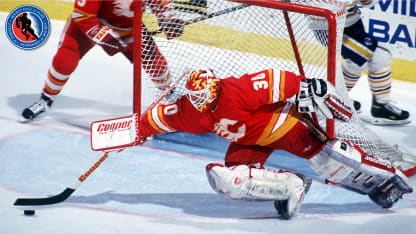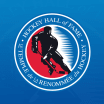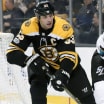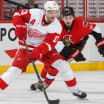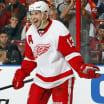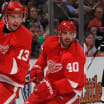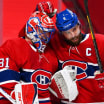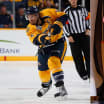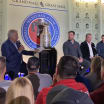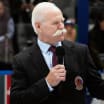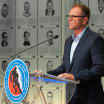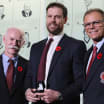Kelly Hrudey has a unique perspective on Mike Vernon's Hockey Hall of Fame induction Monday. A fellow goalie who played 15 seasons in the NHL with the New York Islanders, Los Angeles Kings and San Jose Sharks, Hrudey played against Vernon going back to their teenage days in Alberta and played with him for the Sharks in 1997-98. They were opponents, teammates and friends, and they remain close.
Now a respected TV voice on Sportsnet as a studio analyst on "Hockey Night in Canada" and color commentator covering the Calgary Flames, Hrudey shares his thoughts on Vernon in a special testimonial for NHL.com.
The first time I saw Mike Vernon, I knew he was great. We played against each other in the Alberta provincial championships in 1978, when I was 17 playing for Edmonton and he was 15 playing for Calgary. But when I saw him play in junior, I knew for a fact he was going to be a star in the NHL. He was just too good.
Mike played for the Calgary Wranglers from 1980-83, and he was named the goaltender of the year and most valuable player of the Western Hockey League in 1982 and 1983. Then he helped the Portland Winter Hawks win the 1983 Memorial Cup and was named the most outstanding goalie of the tournament.
I heard people saying, "Yeah, but he's too small," and I always thought to myself, "Well, that's just not accurate. That's putting a label on somebody and not really doing a deep dive into why this person may succeed." Mike was listed at 5-foot-9, 175 pounds, but he could read the play as well as anybody. That's why he was able to make up for his size, because he was ahead of what the shooter may or may not do.
Mike wasn't bothered by a bad result or criticism, and I think that was super-important to his career. I don't think it was easy growing up in Calgary and then being a part of the Calgary Wranglers and then being a part of the Calgary Flames from 1982-94. Not everybody could have handled the scrutiny and criticism he was under. I thought it was enormous. I thought it was overbearing at times, and that's just as an outsider. I always admired his strength mentally to get through it.
Think back to overtime of Game 7 of the 1989 Campbell Conference Semifinals against the Vancouver Canucks. Mike made huge saves, including one on a breakaway by Stan Smyl and another on a slap shot from the top of the right circle by Tony Tanti. Smyl is a legend and Tanti had one of the greatest shots in the NHL at the time. Once again, Mike was under such pressure, and he came up big. The Flames won the game and roared on to win the Cup. I, of course, was a competitor, but I felt so happy for Mike.
When Mike played for the Detroit Red Wings from 1994-97, he played a big role in one of the biggest games in the Red Wings-Colorado Avalanche rivalry. He fought goalie Patrick Roy on March 26, 1997. He wasn't intimidated by Roy, whom he had faced in the Stanley Cup Final in 1986 and 1989, when Roy played for the Montreal Canadiens. And what did you expect? Mike's a western Canadian. He played in the WHL back in the day. He grew up in the Stampede City. That didn't surprise me at all.
Coach Scotty Bowman started Mike in the 1997 Stanley Cup Playoffs, even though he had backed up Chris Osgood in the regular season. Chris was up and coming, a great goaltender in his own right. But from afar, it seemed natural to me that Scotty chose Mike because of his history and pedigree. That team needed that steadiness in the net, and Mike was able to provide that because of his mental mindset. He was just so strong. He won the Conn Smythe Trophy as the MVP of the playoffs, helping the Red Wings win the Cup for the first time since 1955.
Mike played for the Sharks from 1997-2000, ended the 1999-2000 season with the Florida Panthers, then finished his career with the Flames from 2000-02. We hung out and carpooled a lot the season we were together in San Jose. When we were driving to the rink or the airport, he would go on a deep dive about maybe why we were playing well at the time or maybe why we were in a slump. He had it all figured out. Mike knew so much about the entire game, about what the centermen should be doing, what the wingers should be doing in certain situations. He was a hockey savant. He really thought deeply about every position and how it impacted every play.
He won 30 games in 1997-98, helping us make the playoffs for the first time in three seasons. He was by far our team MVP. One thing that amazed me was that if we got a lead from the second period on, he never gave up a game-tying goal. He was that incredible. That really is what his career is all about.
